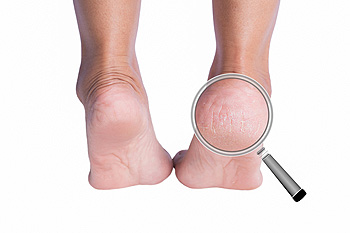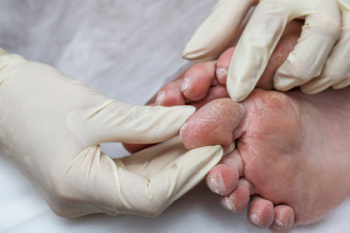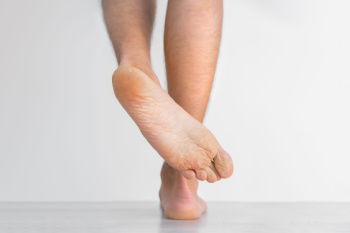
Cracked heels occur when the skin on the heels becomes dry, thick, and unable to stretch properly, leading to splits and discomfort. This condition, known as heel fissures, often results from prolonged pressure on the feet, insufficient moisture, or exposure to harsh conditions. Walking barefoot or wearing open-back shoes can increase the risk by allowing moisture to escape and causing the skin to harden. Medical conditions like diabetes, eczema, or thyroid disorders may also contribute to excessive dryness. Standing for long hours on a hard surface can worsen the problem by adding stress to the heels. This common condition can be painful. If you have developed problematic cracked heels, it is suggested that you consult a podiatrist who can offer effective treatment solutions, which may include prescribed medication for relief.
Cracked heels are unsightly and can cause further damage to your shoes and feet. If you have any concerns, contact Dr. Mark Gagnon from Advanced Podiatry. Our doctor can provide the care you need to keep you pain-free and on your feet.
Cracked Heels
Cracked heels appear unappealing and can make it harder for you walk around in sandals. Aside from looking unpleasant, cracked heels can also tear stockings, socks, and wear out your shoes. There are several methods to help restore a cracked heel and prevent further damage.
How Do You Get Them?
Dry skin is the number one culprit in creating cracked heels. Many athletes, walkers, joggers, and even swimmers suffer from cracked heels. Age and skin oil production play a role to getting cracked heels as well.
Promote Healing
Over the counter medicines can help, especially for those that need instant relief or who suffer from chronic dry feet.
Wear Socks – Wearing socks with medicated creams helps lock in moisture.
Moisturizers – Applying both day and night will help alleviate dryness which causes cracking.
Pumice Stones – These exfoliate and remove dead skin, which allows for smoother moisturizer application and better absorption into the skin.
Change in Diet
Eating healthy with a well-balanced diet will give the skin a fresh and radiant look. Your body responds to the kinds of food you ingest. Omega-3 fatty acids and zinc supplements can also revitalize skin tissue.
Most importantly, seek professional help if unsure how to proceed in treating cracked heels. A podiatrist will help you with any questions or information needed.
If you have any questions, please feel free to contact one of our offices located in Crestwood, Orland Park, and Summit, IL . We offer the newest diagnostic and treatment technologies for all your foot care needs.

Caring for your feet is essential if you have diabetes, as poor circulation and nerve damage can lead to serious complications. Check your feet every day for cuts, blisters, or swelling, even if they feel fine. Wash them with warm water and mild soap, then dry thoroughly, especially between the toes. Keep your skin moisturized to prevent cracks, but avoid putting lotion between the toes, as excess moisture can lead to infections. Wear comfortable, well-fitted shoes and soft, non-restrictive socks to protect against pressure points and irritation. Never walk barefoot, even at home, to reduce the risk of injury. Avoid soaking your feet for long periods of time, as this can weaken the skin. If you notice any pain, redness, or wounds that are not healing, it is suggested that you see a podiatrist to prevent complications before they become serious.
Diabetic foot care is important in preventing foot ailments such as ulcers. If you are suffering from diabetes or have any other concerns about your feet, contact Dr. Mark Gagnon from Advanced Podiatry. Our doctor can provide the care you need to keep you pain-free and on your feet.
Diabetic Foot Care
Diabetes affects millions of people every year. The condition can damage blood vessels in many parts of the body, especially the feet. Because of this, taking care of your feet is essential if you have diabetes, and having a podiatrist help monitor your foot health is highly recommended.
The Importance of Caring for Your Feet
- Routinely inspect your feet for bruises or sores.
- Wear socks that fit your feet comfortably.
- Wear comfortable shoes that provide adequate support.
Patients with diabetes should have their doctor monitor their blood levels, as blood sugar levels play such a huge role in diabetic care. Monitoring these levels on a regular basis is highly advised.
It is always best to inform your healthcare professional of any concerns you may have regarding your feet, especially for diabetic patients. Early treatment and routine foot examinations are keys to maintaining proper health, especially because severe complications can arise if proper treatment is not applied.
If you have any questions please feel free to contact one of our offices located in Crestwood, Orland Park, and Summit, IL . We offer the newest diagnostic and treatment technologies for all your foot and ankle needs.

Athlete’s foot is a fungal infection that affects the skin on your feet, particularly between the toes. It often causes itching, redness, peeling, and sometimes blisters. The condition can be painful and may create a burning or stinging sensation, especially when walking or wearing shoes. The fungus thrives in warm, moist environments, making public showers, locker rooms, and tight shoes common sources of infection. Athlete's foot is highly contagious and can spread through direct contact or by touching contaminated surfaces. It can remain contagious as long as the fungus is present, often lasting several weeks, if untreated. A podiatrist can diagnose athlete's foot through a physical examination and may take a sample of the skin to identify the fungus. Treatment typically involves antifungal creams, sprays, or oral medication. Keeping feet clean, dry, and well-ventilated can help prevent reinfection. If you have this condition, it is suggested that you schedule an appointment with a podiatrist for the right treatment.
Athlete’s Foot
Athlete’s foot is often an uncomfortable condition to experience. Thankfully, podiatrists specialize in treating athlete’s foot and offer the best treatment options. If you have any questions about athlete’s foot, consult with Dr. Mark Gagnon from Advanced Podiatry. Our doctor will assess your condition and provide you with quality treatment.
What Is Athlete’s Foot?
Tinea pedis, more commonly known as athlete’s foot, is a non-serious and common fungal infection of the foot. Athlete’s foot is contagious and can be contracted by touching someone who has it or infected surfaces. The most common places contaminated by it are public showers, locker rooms, and swimming pools. Once contracted, it grows on feet that are left inside moist, dark, and warm shoes and socks.
Prevention
The most effective ways to prevent athlete’s foot include:
- Thoroughly washing and drying feet
- Avoid going barefoot in locker rooms and public showers
- Using shower shoes in public showers
- Wearing socks that allow the feet to breathe
- Changing socks and shoes frequently if you sweat a lot
Symptoms
Athlete’s foot initially occurs as a rash between the toes. However, if left undiagnosed, it can spread to the sides and bottom of the feet, toenails, and if touched by hand, the hands themselves. Symptoms include:
- Redness
- Burning
- Itching
- Scaly and peeling skin
Diagnosis and Treatment
Diagnosis is quick and easy. Skin samples will be taken and either viewed under a microscope or sent to a lab for testing. Sometimes, a podiatrist can diagnose it based on simply looking at it. Once confirmed, treatment options include oral and topical antifungal medications.
If you have any questions, please feel free to contact one of our offices located in Crestwood, Orland Park, and Summit, IL . We offer the newest diagnostic and treatment technologies for all your foot care needs.

